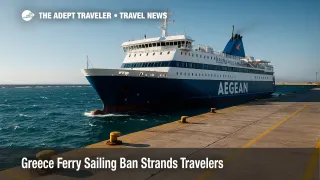Greece Ferry Sailing Ban Strands Travelers

Greece imposed a Greece ferry sailing ban on Friday morning as strong meltemi battered the Aegean. Port authorities in Piraeus, Rafina, and Lavrio halted most departures to the Cyclades after winds reached gale force, with officials planning a midday review. Some near-coast services may operate case by case, but the bulk of island sailings are paused while seas remain rough. Travelers are urged to confirm schedules before heading to the port. Early reports cite gusts up to 9 Beaufort and widespread cancellations across popular routes.
Key Points
- Why it matters: Peak-season island travel is snarled by a Greece ferry sailing ban.
- Travel impact: Widespread ferry cancellations Greece, congestion at Attica ports, and rolling rebookings.
- What's next: Ports will reassess conditions around midday, with gradual restarts once winds ease.
- Aegean Sea winds peaked near gale force, affecting Cyclades links most.
- Argosaronic services are limited, subject to operator and captain approval.
Snapshot
Port authorities paused most departures from Piraeus, Rafina, and Lavrio as Aegean Sea winds strengthened early Friday. Priority goes to safety, so only select near-shore or sheltered routes may run, depending on vessel type and captain sign-off. Expect long lines at terminals, rolling delays, and same-day rebookings once the "green light" is given. Forecast maps show strong northerlies persisting across key Aegean corridors, especially between Attica and the Cyclades. Check the Hellenic National Meteorological Service marine forecast before you set out to the port. Hellenic National Meteorological Service marine forecast: https://emy.gr/en/marine?utm_source=adept.travel.
Background
The meltemi, a dry northerly flow that dominates July and August, routinely complicates island shipping when it ramps to 7 to 9 Beaufort. When seas steepen, Greek authorities commonly issue a sailing ban from major Attica gateways to the open Aegean, while some Argosaronic Gulf links continue on a limited basis. The current episode follows a classic pattern, with winds funneled down the Aegean basin and roughest conditions on exposed Cyclades routes. On Thursday, gusts near 60 kilometers per hour were recorded along the east coast of Attica near Rafina, a sign of the strengthening burst that has now triggered widespread suspensions. As always, operating decisions shift with conditions and vessel capability, so travelers should expect line-by-line adjustments.
Latest Developments
Attica extends restrictions as Greece ferry sailing ban reviewed
Authorities confirmed cancellations from Piraeus, Rafina, and Lavrio to many Aegean islands, particularly the Cyclades, with a formal reassessment slated around midday. The Port Authority and Coast Guard are coordinating rolling updates to carriers, who will restart once wave heights and crosswinds fall within limits. Travelers are advised not to proceed to terminals without a confirmed departure time, since queuing traffic is heavy and timetable changes are frequent during meltemi spikes. For official notices, refer to the Hellenic Coast Guard and your carrier's channels. Hellenic Coast Guard: https://www.hcg.gr/en/?utm_source=adept.travel.
Aegean Sea winds to peak Friday, easing gradually into the weekend
Forecast guidance indicates Aegean Sea winds remain strong through Friday, then begin easing unevenly by late Saturday into Sunday, with exposed channels still gusty. That outlook supports a phased return of services, starting with larger or more sheltered routes before open-sea Cyclades links. Travelers with flexible itineraries should consider shifting to later sailings, or routing via less-exposed connections if offered by their operator. For route planning and sea-state visualization, consult the National Observatory of Athens sailing maps. NOA sailing maps: https://www.meteo.gr/sailingmaps-En.cfm?utm_source=adept.travel.
Analysis
For operators, this pause compresses several waves of demand into a narrow reprieve window, which is why ferries often return with altered timings and capacity constraints once the ban lifts. Expect knock-on effects across vehicle decks and cabin inventories for at least 24 to 48 hours, especially on Cyclades trunks. Carriers typically prioritize same-day displaced passengers, then roll forward remaining bookings, so travelers who can accept later departures or alternate islands may be reprotected sooner.
From a risk standpoint, Aegean Sea winds are the principal summer disruptor to Greece's maritime network. Because the meltemi can pulse several times in a week, the best tactic is to build buffer time around inter-island hops, pre-select refundable fares where possible, and keep accommodation check-in flexible on wind-exposed islands. Communication matters, since ferry cancellations Greece are often confirmed within short windows as the Coast Guard issues updates. Subscribe to carrier alerts, monitor EMY guidance, and avoid port queues until your specific sailing is confirmed.
For travel advisors, clarity beats speed. Proactively explain why a Greece ferry sailing ban protects safety, outline realistic restart scenarios, and offer concrete alternates, for example larger vessels on less-exposed routes, temporary stays in Attica, or mainland detours. Messaging that ties rebooking options to the trajectory of Aegean Sea winds helps set expectations and reduces churn when the next meltemi surge arrives.
Final Thoughts
Friday's meltemi has again shown how quickly Aegean conditions can shift, especially during August peaks. If you are holding island tickets today, wait for a confirmed time from your carrier before heading to port, then plan for residual delays as lines clear. Build slack into your itinerary for the next few days, and consider alternates if your route stays wind-exposed. With patience and prompt communication, most travelers will still make their crossings once seas settle. The safety-first approach behind a Greece ferry sailing ban is inconvenient today, but it helps the network reset faster for everyone tomorrow.
Sources
- Strong Winds Cause Ferry Cancellations and High Fire Risk in Greece, Greek Reporter
- Weather: Sailing ban from Piraeus, Rafina, Lavrio due to winds, Proto Thema
- Wind riders: Kiteboarders flock to Greek coast as August gales churn sea, AP News
- HNMS Marine forecasts and bulletins, Hellenic National Meteorological Service
